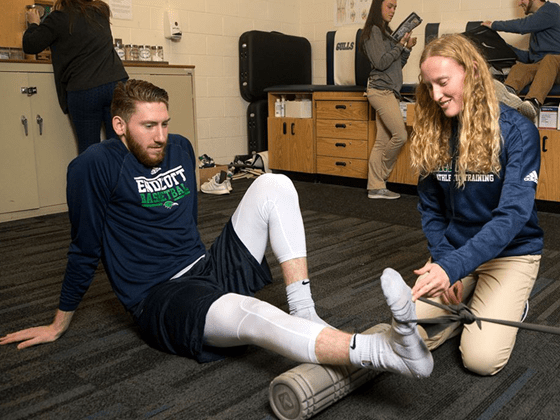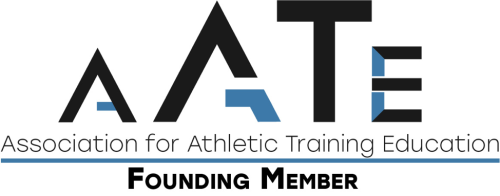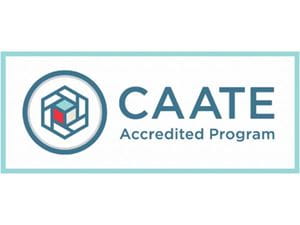-
Program Overview
Endicott’s M.S. in Athletic Training program will allow students to gain practical hands-on experience and develop a strong foundation in the discipline through a well-rounded educational curriculum, based on the competencies and proficiencies established by the CAATE 2020 Professional Standards and beyond.
Students enrolled in the program will gain clinical experience with diverse populations across various settings, including collegiate, pediatric, primary care, and specialized fields, offering exposure to different aspects of clinical practice. Students will be challenged to apply their didactic knowledge with experienced preceptors who will support their evolving skill development. Students will complete over 53 weeks of clinical experience, totaling over 1,200 contact hours, including three immersive experiences. Each immersive experience focuses on enhanced skill acquisition, interprofessional socialization, and transition to practice.
Unique features of the program:
-
Engage in clinical experiences and with knowledgeable preceptors that will support your knowledge and skill development.
-
Immediately apply your knowledge and skills with high level athletes under the guidance and supervision of team physicians and athletic trainers.
-
Participate in numerous networking opportunities with a variety of allied health professionals during clinical experiences, conferences, lectures, club activities, alumni and industry events.
-
Learn innovative techniques while practicing in our state of the art facilities with our experienced and knowledgeable faculty.
Request Information
 According to the U.S. Department of Labor Statistics, the job outlook for athletic trainers is expected to increase 23% 2020-30.
According to the U.S. Department of Labor Statistics, the job outlook for athletic trainers is expected to increase 23% 2020-30. -
-
Admissions Requirements
Admissions Requirements
All candidates must apply online.
Applicants should submit the following to Graduate Admission, Endicott College, 376 Hale Street, Beverly, MA 01915:
-
Non-refundable $50.00 application fee (check made payable to Endicott College, cash or online) Application fee waived for veteran and military students;
-
One letter of recommendation (academic or professional reference);
-
Official transcripts of all post-secondary academic work sent directly from the institution(s) including confirmation of undergraduate degree, date confirmed, and any other graduate work;
-
Essay of 250-500 words on career goals and motivation for graduate study;
-
Test of English as a Foreign Language (TOEFL) for all students whose native language is not English; minimum score of 550 (paper-based) or 79 (iBT) is required. The institutional code for Endicott College is 3369. Endicott also accepts an IELTS score of 6.0 or better;
-
Students must have completed an undergraduate bachelor’s degree and have maintained a 3.0 cumulative GPA and completed all prerequisite core coursework with a C+ or better. Prerequisite coursework includes:
-
4 credits of Biology (with lab)
-
4 credits Human Anatomy (with lab)
-
4 credits Human Physiology (with lab)
-
4 credits Chemistry (with lab)
-
4 credits Physics (with lab)
-
4 credits Exercise Physiology (with lab)
-
4 credits Kinesiology/Biomechanics
-
Statistics or Research Methods
-
General Psychology
-
Nutrition
-
-
Students must also meet specific requirements including:
-
Documented minimum of 30 hours under the direct supervision of a certified athletic trainer. Download a sample hours log.
-
Students must meet the Technical Standards and expectations with or without accommodations.
- Completed Health Form / Immunizations (See MSAT Student Handbook: Appendix A)
-
MSAT Transfer Credits
No more than six semester hours of graduate credits may be transferred from one or more other institutions toward the master’s degree. Courses accepted for transfer credit must be completed during the five-year period of candidacy, have a grade of B or better, and be directly applicable to Endicott’s MSAT program.. Additionally, such courses must carry graduate credit at an accredited institution with a notation to that effect on the official transcript.
Transfer courses will be evaluated on a case-by-base basis by the Program Director. Such evaluation may also require the submission of a course syllabus and course assignments. An official transcript from each college/university attended is required.
International Applicants for Graduate Admission
Endicott College welcomes and encourages applicants from around the world. International applicants are required to hold a college or university degree equivalent to a four-year American baccalaureate degree. Educational documents in a foreign language are required to be translated into English. All transcripts and translations of transcripts must be official originals and must show courses completed, grades received, grading scale, duration of study, degree or diploma received, and the date conferred. Endicott College reserves the right to request verification of the credentials by an external agency.
International applicants must submit current TOEFL scores when their native language is not English or when their baccalaureate transcript is not from an institution where English is the language of instruction. Once students have been admitted as degree candidates, Endicott College will send detailed instructions about the process for acquiring an Endicott-sponsored student visa.
Continued Matriculation and Graduation
Once in the professional (graduate) phase of the program students must maintain a minimum of a 3.0 cumulative GPA. Students receiving grades lower than B- for six graduate credits will be placed under academic review. Students will be placed under academic probation if their GPA falls below 3.0. Continued unsatisfactory academic progress may lead to dismissal or loss of financial aid. Failure to meet or maintain any of the program's Technical Standards may also result in dismissal from the program. Please see the MSAT student handbook to view the full academic policy regarding continued progress in the Athletic Training program.
Program Costs and Financial Aid
-
-
Curriculum
Curriculum Requirements - Total Credits Required: 72
MSAT Year One
Summer Session I, First Six Weeks - Credits: 5
-
MSAT 505 - Medical Terminology (online) (Cr: 1)
-
MSAT 510 - Regional Anatomy (Cr: 4)
Summer Session I, Second Six Weeks - Credits: 7
-
MSAT 504 - Advanced Emergency Management (Cr: 4)
-
MSAT 540 - Functional Anatomy (Cr: 3)
Fall - Credits: 17
-
MSAT 514 - Evidenced Based Practice I (Cr: 3)
-
MSAT 520 - Assessment & Diagnosis I (Cr: 4)
-
MSAT 522 - Mechanical Agents (Cr: 3)
-
MSAT 525 - Therapeutic Interventions I (Cr: 4)
-
MSAT 533 - Clinical Education I (Cr: 3)
Spring - Credits: 17
-
MSAT 521 - Assessment & Diagnosis II (Cr: 4)
-
MSAT 524 - General Medical Conditions (Cr: 3)
-
MSAT 526 - Therapeutic Interventions II (Cr: 4)
-
MSAT 534 - Clinical Education II (Cr: 3)
-
MSAT 541 - Behavioral Health (Cr: 3)
MSAT Year Two
Summer Session II - Credits: 3
-
MSAT 532 - Clinical Education III (Cr: 2)
-
MSAT 615 - Diagnostics (Cr: 1)
Fall - Credits: 15
-
MSAT 516 - Evidenced Based Practice II (Cr: 3)
-
MSAT 600 - Interprofessional Seminar (Cr: 2)
-
MSAT 602 - Professional Preparation I (Cr: 1)
-
MSAT 610 - Quality Improvement & Informatics (Cr: 3)
-
MSAT 620 - Pharmacology (Cr: 2)
-
MSAT 640 - Clinical Education Immersion (Cr: 4)
Spring - Credits: 8
-
MSAT 603 - Professional Preparation II (Cr: 1)
-
MSAT 645 - Advanced Concepts in Human Performance (Cr: 2)
-
MSAT 670 - Clinical Externship (Cr: 2)
-
MSAT 675 - Capstone (Cr: 3)
Learning Outcomes
Upon completion of the program, students will:
- Practice in a manner that advocates for the health needs of clients and is congruent with the ethical standards of the profession.
- Develop critical thinking and independent decision-making skills for the care of athletic related injuries and illnesses.
- Demonstrate the ability to apply clinical skills and make evidence-based decisions to optimize patient outcomes.
- Communicate effectively and appropriately with clients/patients, family members, coaches, administrators, health care professionals, consumers, payors, policy makers, and others.
- Demonstrate their confidence and ability to successfully transition to professional practice.
View academic catalog and learning outcomes -
MSAT 505 - Medical Terminology (online) (Cr: 1)
-
Clinical Overview
MSAT Clinical Overview
The Master of Science in Athletic Training program contains 53 weeks of diverse clinical experiences with varied patient populations. During the program, students will complete over 1,200 progressively intensive clinical contact hours. All clinical rotations and hours are supervised by an experienced preceptor who will foster critical thinking and facilitate skill development through guided and autonomous learning opportunities. Over the course of two years, students can engage in experiences within the private, public, or preparatory pediatric setting, Division I, II, or III collegiate setting, orthopedic medicine, general medicine, and other areas specific to each student’s career goals. Each clinical experience is specifically structured to provide students with immense opportunity to practically apply the foundational knowledge and theoretical underpinnings learned while in the classroom to concrete encounters for the purpose of creating new knowledge.
Clinical Education Requirements
To ensure the health and safety of each student and patient, once accepted or matriculated into the MSAT program, students are required to demonstrate that all immunizations have been completed and are current. Other clinical education requirements may include background checks, fingerprints, and possibly drug testing.
Throughout the program, students will experience athletic training in a variety of settings. All students must have or arrange transportation to any off campus clinical sites. Site locations and distances vary. Students are responsible for all associated travel costs and are encouraged to carpool when clinical schedules are alike.
Clinical Education Plan
Semester Credits Course Setting Opportunities Minimum Hour/Week Requirement Fall I 3 cr. MSAT 533—Clinical Education I Pediatric or Collegiate Athletics setting 225 hours / 14 weeks Spring I 3 cr. MSAT 534—Clinical Education II Pediatric or Collegiate Athletics setting 225 hours / 14 weeks Summer II 2 cr. MSAT 532—Clinical Education III Non-Traditional Athletic Training setting (immersive) 150 hours / 6 weeks
Fall II 4 cr. MSAT 640—Clinical Education Immersion Division I, II, III collegiate athletics (immersive) 400 hours / 8 weeks Spring II 2 cr. MSAT 670—Clinical Internship Area of special interest (immersive) 200 hours / 8 weeks Fall I
Clinical Education I (MSAT 533) - This clinical education experience includes a combination of clinical contact hours (14 week, 225 hour minimum) and classroom lab experience. This course will focus on the development and integration of student emergency care, clinical assessment, decision making and rehabilitation with an emphasis on orthopedic evaluation, documentation, and communication skills. (3 cr.)
Prerequisites
MSAT 510–Regional Anatomy
MSAT 505–Medical Terminology
MSAT 540–Functional Anatomy
MSAT 504–Advanced Emergency Management
Concurrent Coursework
MSAT 520–Assessment & Diagnosis I (4 cr.)
MSAT 525–Therapeutic Interventions I (4 cr.)
MSAT 514–Evidenced Based Practice I (3 cr.)
MSAT 533– Clinical Education I (3 cr.)
MSAT 522–Mechanical Agents (3 cr.)
Spring I
Clinical Education II (MSAT 534) – This clinical education experience includes a combination of clinical contact hours (14 week, 225 hour minimum) and classroom lab experience. This experience continues to foster the development and integration of each student in the areas of professional communication, injury prevention, clinical assessment, decision making, and rehabilitation. Students will also be introduced to various general medical conditions, diagnostic testing, and postural assessment. (3 cr.)
Prerequisites
MSAT 520–Assessment & Diagnosis I (4 cr.)
MSAT 525–Therapeutic Interventions I (4 cr.)
MSAT 514–Evidenced Based Practice I (3 cr.)
MSAT 533– Clinical Education I (3 cr.)
MSAT 522–Mechanical Agents (3 cr.)
Concurrent Coursework
MSAT 521–Assessment & Diagnosis II (4 cr.)
MSAT 526–Therapeutic Interventions II (4 cr.)
MSAT 541–Behavioral Health (3 cr.)
MSAT 524–Gen Med Conditions (3 cr.)
MSAT 534–Clinical Education II (3 cr.)
Summer II
Clinical Education III (MSAT 532)— Students will complete a six week (150 hour) immersive clinical experience within a non-traditional athletic training setting. This rotation will build upon and emphasize student evaluative and assessment techniques and skills on orthopedic and non-orthopedic injuries and illnesses. Students will further develop communication skills while treating diverse patients throughout the lifespan who participate in sport and non-sport activities at varying levels and are of different sexes and socioeconomic status. (2 cr.)
Prerequisites
MSAT 521–Assessment & Diagnosis II (4 cr.)
MSAT 526–Therapeutic Interventions II (4 cr.)
MSAT 541–Behavioral Health (3 cr.)
MSAT 524–Gen Med Conditions (3 cr.)
MSAT 534–Clinical Education II (3 cr.)
Concurrent Coursework
MSAT 615 Diagnostics (1 cr.)
Fall II
Clinical Education Immersion (MSAT 640)— Students will complete an 8 week (400 hour minimum) immersive clinical experience within athletic training. During this rotation students will utilize their knowledge and skills in each domain of athletic training, displaying competence as they progress towards mastery. Participating as part of the interprofessional healthcare team, students will refine and demonstrate with a high level of expertise the qualities, characteristics, and skills of an athletic trainer. (4 cr.)
Prerequisites:
MSAT 533–Clinical Education I
MSAT 534–Clinical Education II
MSAT 532–Clinical Education IIIConcurrent Coursework
MSAT 513—Evidenced-Based Practice II (1 cr.)
Spring II
Clinical Externship (MSAT 670) – This eight week immersive experience is designed to provide students with the latitude to gain athletic training experience in their specific interest of clinical practice and where athletic trainers commonly practice. These settings include, but are not limited to: professional, collegiate, high school, hospital, physician offices, military, performing arts, industrial etc. This experience will challenge students to integrate each of the domains and principles of athletic training in real patient care settings. (2 cr.)
Prerequisites
MSAT 533–Clinical Education I (3 cr.)
MSAT 534–Clinical Education II (3 cr.)
MSAT 532–Clinical Education III (2 cr.)
MSAT 640–Clinical Education IV (4 cr.)Concurrent Coursework
MSAT 603–Prof. Preparation II (1 cr.)
-
Mission & Goals
MSAT Program Mission
The mission of the Endicott College Athletic Training program is to prepare students with the knowledge and skills to care for a diversity of patients, utilizing patient-centered care, interprofessional practice, and evidence-based approaches. Our program endeavors to promote critical and innovative thinking for the development of ethical and empathetic healthcare providers who strive to be lifelong learners.Program Goals
-
The program will prepare students to practice culturally sensitive and equitable patient-centered care.
-
The program will prepare students to engage in the clinical application of innovative skills in patient care.
-
The program will prepare students to implement critical inquiry in applying evidence-based practice to various patient needs.
-
The program will develop student skills in effective and respectful communication involving patients and integrative collaborative professional practice.
-
The program will prepare students to successfully transition to professional practice.
Student Learning Outcomes
At the completion of the program students will:
-
Students will practice in a manner that advocates for the health needs of clients and is congruent with the ethical standards of the profession.
-
Students will develop critical thinking and independent decision-making skills for the care of athletic related injuries and illnesses.
-
Students will demonstrate the ability to apply clinical skills and make evidence-based decisions to optimize patient outcomes.
-
Students will communicate effectively and appropriately with clients/patients, family members, coaches, administrators, health care professionals, consumers, payors, policy makers, and others.
-
Students will demonstrate their confidence and ability to successfully transition to professional practice.
-
An accelerated five-year program that prepares you to enter the Athletic Training profession
Athletic Training Statistics
72
credit program
2
years to completion
53
Weeks
Of clinical experience, preparing you to succeed professionally in the field
AATE







